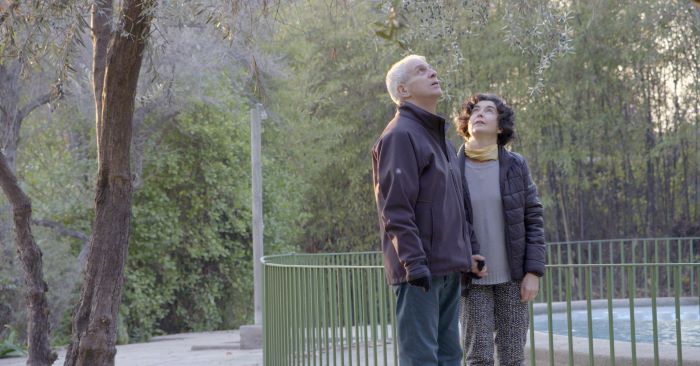![]() In feature films we have Michael Haneke’s Amour and Florian Zeller’s The Father (to name two prominent titles), both of which deal with the more harrowing aspects of aging. Amour is especially notable for its depiction of love among the aged, and The Father an especially brutal representation of Alzheimer’s. The Eternal Memory, a Chilean documentary, contains elements of both, though the atmosphere is not crushing: Its emphasis lies elsewhere.
In feature films we have Michael Haneke’s Amour and Florian Zeller’s The Father (to name two prominent titles), both of which deal with the more harrowing aspects of aging. Amour is especially notable for its depiction of love among the aged, and The Father an especially brutal representation of Alzheimer’s. The Eternal Memory, a Chilean documentary, contains elements of both, though the atmosphere is not crushing: Its emphasis lies elsewhere.
Viewers may be struck first of all by the presence of laughter. In a grainy opening scene, Paulina Urrutia wakes up her husband, Augusto Góngora, in bed. She kindly reminds him who he is and who she is. This becomes a little game between them. They laugh together as they successfully reestablish their identities and relationship.
Augusto, once a prominent journalist, has had Alzheimer’s for eight years. Paulina, an actress and a former minister of culture, has been with him for 25 years. Upon his diagnosis, she has managed to incorporate him into her life rather than leave him at home with someone else. And so, he follows her to rehearsal, and she regularly works to activate his memory in their conversations and to help him remember. Other times, they walk together, joke around in the house, or attend an exercise class. There are scenes in which a confused and frightened Augusto calls for help in the night, which take place past the midway point. Throughout, though, the viewer is conscious of the incredible ebullience and energy Paulina (“Pauli” for short) brings to her attempts to save her husband’s memory for as long as she can and Augusto’s remarkable responsiveness to her. There is much laughter, though in some instances we sense the laughter suppressing tears.
If the film had only comprised these gentle sequences, it would have still been a moving experience. Yet director Maite Alberdi (The Mole Agent) casts her net a little wider, and the film takes on surprising resonances. The previously mentioned scenes are interspersed with older footage, some in the form of home movies, others of Augusto’s past as a journalist. Certainly, the amateur videos help to give the couple’s relationship even more emotional depth, as well as to showcase how film itself is a remarkable preserver of otherwise lost moments.
Augusto, an underground television journalist during the time of Pinochet, served an instrumental role in spreading news that the regime did not want to be seen. Therefore, it is not only one man’s memory that is under discussion, but a country’s cultural and historical memory. Some of Augusto’s writing is movingly excerpted at the end, in which he states the importance of memory as a way to recover and preserve identity.
Some may feel that this political dimension is underexplored, but the film has a marvelous way of moving smoothly between disparate aspects of memory and its significance. The result is intimate and unexpectedly rich.







Leave A Comment